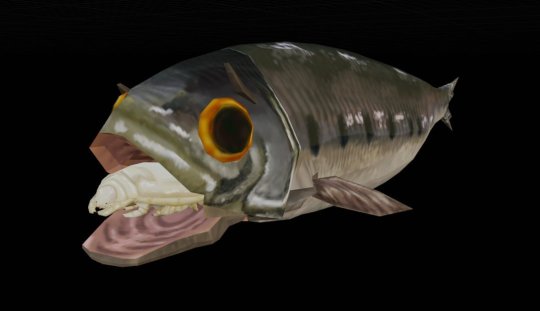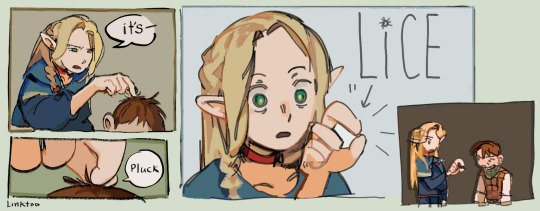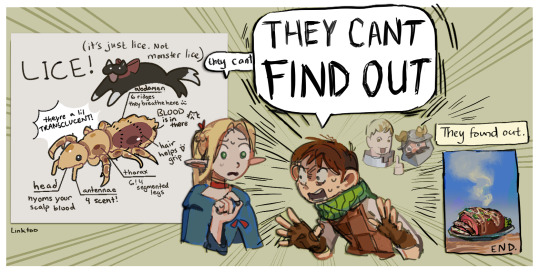#eating insects
Explore tagged Tumblr posts
Text


"The countries with the highest consumption of insects are Mexico (450 species) [...] In North America, Mexico has the highest proportion of reported consumed insect species at 89%."
The global atlas of edible insects: analysis of diversity and commonality contributing to food systems and sustainability
79 notes
·
View notes
Text
I've been trying to find a practical guide to foraging and eating insects and wow there are really none available. At best there's sensationalized apocalypse prepper stuff but idk if I should trust those for just incorporating wild insects into my diet....
Anyone got any decent recs?
I live in the southeast USA.
#book rec#foraging#foraged food#eating insects#eating insects safely#foraging insects#foraging book rec
4 notes
·
View notes
Text

instagram
#Instagram#vibranterprise#klaus schwab#globalists#wef#world economic forum#covid booster#eating insects
4 notes
·
View notes
Text

Just recently started harvesting from my mealworm farm, and it's a really great way to add protein to noodles or rice or whatever. In this dish it reminded me a little of having peanuts on Thai food, though I only got a crunch in my more recent mealworm ramen. Definitely recommend, and they're easy as hell to raise.
2 notes
·
View notes
Text


Well, I ate some cicadas! Just to challenge and overcome my cultural bias against eating bugs. They were mostly crunch, very little flavor. A slight toastiness, which was emphasized by being fried in bacon fat. If anyone else wants to try, the tips I picked up are:
Gather the cicadas as soon as possible after they emerge from their husks (before their exoskeleton completely hardens)
Put them in a baggie in the freezer. They will go back into hibernation and die peacefully in their sleep. You can eat them the next day or wait until you're ready.
Remove the wings before cooking them.
2 notes
·
View notes
Text

#Astro Note#アストロノオト#Uemachi Aoi#Insects of Tumblr#Eating Insects#Bug Fancy#I Love Bugs#Anime#Anime GIF#My GIFs#ffeatherisffeather
2 notes
·
View notes
Text
Cicada PSA
"Brood XIX and Brood XIII will both emerge this spring. The last time these bugs showed up at the same time in the United States, Thomas Jefferson was president."
See here for recipes.
#cicadas#eating insects#brood XIX#brood XIII#new food source#recipes for cicadas#PSA#let's eat bugs!
2 notes
·
View notes
Text
I learned something:
ants? they taste SPECTACULAR! they have acid in their bodies that doesn't do much to us except taste super sour and spicy, like hot peppers and limes.
The high acid content did make me feel some indigestion after snacking on about 10 of them, but I'm sure some rice would clear that up just fine. I have so many recipe ideas now.. who knew we had such common, powerful and FREE spices right here in north america!
in case anybody is worried about how humane this is, I believe that my method is sustainable and acceptable. I first aggravate some of the nest with a skinny stick and eat the ones who latch on like how other apes do it in a documentary I saw. They achieve a warrior's death, and the nest recovers quickly.
#eating insects#food#foraging#none of them bit me at any point#I guess my mouth is too gooey on the inside#gimme cool ant recipes
0 notes
Text

Tongue Eating Louse and Fish from How Fish Is Made
#Tongue Eating Louse#fish#insect#How Fish Is Made#thank you for your submission!#thanks i really hate this#tw#parasitism#parasite
5K notes
·
View notes
Text
Insectivore conspiracy theory is in the running for the biggest disconnect between what the conspiracy theorists say is happening and what's actually happening. Silly as East Palestine trutherism is, for instance, there actually was a train with a dangerous chemical and it actually did derail
The eating insects thing
A far-right anti-vax conspiracy theory that has existed for a few years now has recently increased in popularity and has been breaching containment, especially in vegan circles, so I guess we have to talk about it:
Keep an eye out for scary sounding posts about eating insects.
Some of the claims to expect are this:
Governments are secretly allowing more insects to be put into food. - It is true that more edible insects have been approved for the EU market lately, but this process is not secret at all.
Some people are allergic to Chitine, which is found in shellfish and hard-shelled insects - this is true.
Chitine is also dangerous to people who are not allergic to it and causes cancer - this is not true. It traces back to study that has been taken out-of-context about the impact of concentrated Chitine in cancer identification and treatment.
Eating large amounts of the insects being approved would damage your stomach lining or other intestines because of ‘toxic chitine’. - this is not true. It traces back to an old dietary advice on a Dutch website which only mentioned that insect consumption was safe up to 45 grams at a time. What this meant was: we didn’t find a study that researched higher doses. There are plenty of studies by now and it turns out it’s fine.
Insects are ‘bird food’ and humans did not evolve to digest the insects currently being approved for consumption. - this is not true. There are 1500 insect species that are regularly safely consumed by millions of people around the world. The insects that are currently being approved for the European market have been consumed by humans for as long as we can trace the human diet and many are consumed by our closest primate relatives.
Bill Gates and other insert-conspiracy-name-here billionaires are buying up farm land to deliberately cause food shortages and to force us to eat bugs - this is not true. Land is just a popular investment right now due to other economic pressures.
Governments are pushing for lower meat consumption to force us to eat bugs. - this is not true. Any minimal encouragement of reduced meat consumption by governments is in response to the impact of meat consumption on climate change.
If you buy in to some of these scare stories, the next claim is that forcing people to eat bugs serves some darker government purpose, either simple misery and humiliation (accompanies by the claim that we’ll be forced to eat weeds and drink sewage water), forced population control (the Great Reset bullshit) or preparing us for the rule of reptilian overlords (antisemitism crap).
Now, let me be clear: there are valid reasons why you might want to avoid eating insects. ‘I just don’t want to’ is a good enough reason. Being vegan is an excellent reason. We know very little about the inner lives of insects but observations suggest that they are intelligent and feel pain. We do not currently know what constitutes a high quality of life or a painless death, so we could not ‘humanely’ farm insects even if we wanted to.
However, most of the claims above are misleading, racist and dangerous. They pave the way into far-right anti-vax and antisemitic conspiracy theories. Recognize them and avoid them. If you see your vegan friends share these claims: let them know what they’re doing. Don’t give this shit space.
648 notes
·
View notes
Text
Insects are eaten in 128 countries, according to a study published this year in the journal Scientific Reports, which found 2,205 species are eaten worldwide. Most of these species are in Asian countries, followed by Mexico, and African countries. In Thailand, India, the Democratic Republic of Congo and China hundreds of species of insect are consumed, with Brazil, Japan and Cameroon each eating 100 or more species. Singaporean chefs will be able to import many creative insect recipes from around the world, where they are served deep fried, on sticks, in noodles, in margaritas, in arancini, tinned, or confit. Insect products are sold round the world in restaurants, markets, supermarkets and from vending machines. The EU is in the process of approving more insects as what it calls a “novel food source”, but to date it has approved only four. Australiahas only approved three species – a cricket and two kinds of mealworm – so far as “non-novel, non-traditional” food sources.
[...]
Why does the UN want us to eat insects? Because it is crunch time climate-wise, and insects are a much more sustainable source of protein than livestock. They have a high “conversion rate”, which means they are efficient at turning plant energy into protein, or in other words, turning what they eat into their own bodies. “Crickets need six times less feed than cattle, four times less than sheep, and twice less than pigs and broiler chickens to produce the same amount of protein,” according to the FAO. They can also be farmed indoors, use less space and water, and produce lower emissions. Because they can be farmed in rural and urban areas in relatively small rooms, they can also be a source of income for people who have less access to land or the training needed to farm livestock.
10 July 2024
54 notes
·
View notes
Text










Edible Insects (NOVA Season 48, Episode 16)
1 note
·
View note
Text



new dish dropped
#marcille donato#chilchuck tims#izutsumi#dungeon meshi#delicious in dungeon#my art#Linktoo art#comic#tw unsanitary#tw insect#tw bugs#(starts eating the lice off your head culinary style)#busting it down culinary style
6K notes
·
View notes
Text
Insect Superfoods: The Surprising Solution to Food Scarcity and Climate Change
As the world grapples with the intertwined challenges of food scarcity, climate change, and environmental degradation, an unexpected contender is emerging on the global menu – insects. These six-legged critters, once relegated to the fringes of gastronomy, are making a bold entrance onto our plates as a solution that could help tackle some of humanity’s most pressing issues. From their…

View On WordPress
#carbon neutral#climate change#eating insects#eco-friendly#farming#food production#food scarcity#insects#nutrition#overpopulation#reduce emissions#sustainability#sustainable farming
1 note
·
View note
Text


Well, I ate some cicadas! Just to challenge and overcome my cultural bias against eating bugs. They were mostly crunch, very little flavor. A slight toastiness, which was emphasized by being fried in bacon fat. If anyone else wants to try, the tips I picked up are:
Gather the cicadas as soon as possible after they emerge from their husks (before their exoskeleton completely hardens)
Put them in a baggie in the freezer. They will go back into hibernation and die peacefully in their sleep. You can eat them the next day or wait until you're ready.
Remove the wings before cooking them.
0 notes